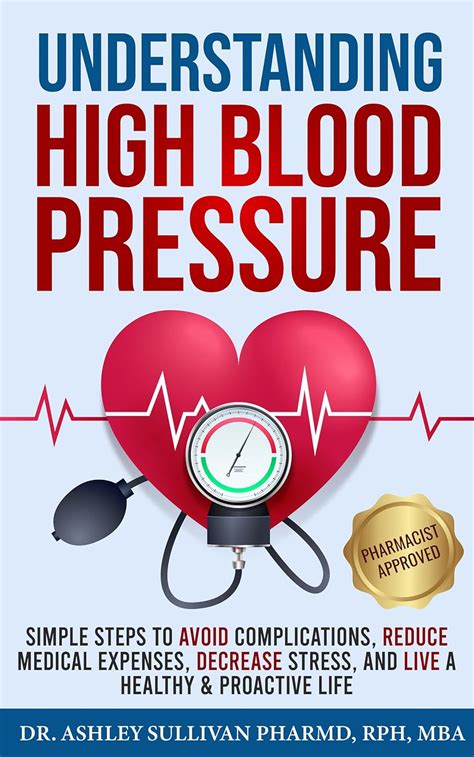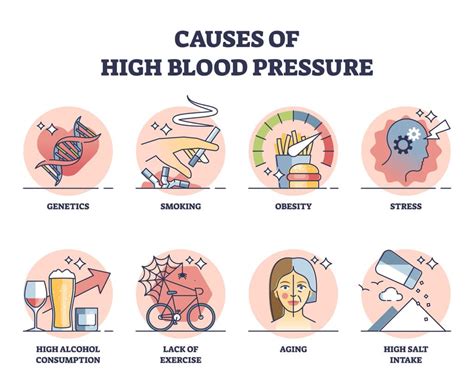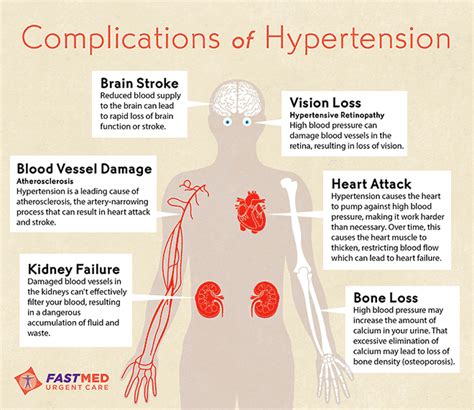Intro
Discover how high blood pressure impacts overall health, increasing risk of heart disease, stroke, and kidney damage, affecting mental well-being, and compromising cardiovascular systems, learn to manage hypertension.
High blood pressure, also known as hypertension, is a serious medical condition that affects millions of people worldwide. It is a major risk factor for heart disease, stroke, and kidney disease, and can have a significant impact on a person's quality of life. Despite its prevalence, many people do not fully understand the effects of high blood pressure on the body. In this article, we will explore the ways in which high blood pressure can affect you, and what you can do to manage and prevent it.
High blood pressure is often referred to as a "silent killer" because it can cause damage to the body without any noticeable symptoms. This means that many people are unaware that they have high blood pressure until it is too late, and they have already suffered from a serious health complication. However, by understanding the effects of high blood pressure, you can take steps to protect yourself and reduce your risk of developing this condition.
The importance of managing high blood pressure cannot be overstated. If left uncontrolled, high blood pressure can lead to serious health problems, including heart attack, stroke, and kidney failure. It can also cause damage to the blood vessels, heart, and other organs, leading to a range of complications. By taking steps to manage high blood pressure, you can reduce your risk of developing these complications and improve your overall health and wellbeing.
Understanding High Blood Pressure

Causes of High Blood Pressure
The causes of high blood pressure are complex and multifaceted. Some of the main risk factors include: * Family history * Age * Obesity * Lack of physical activity * Smoking * Excessive alcohol consumption * High sodium intake * StressEffects of High Blood Pressure on the Body

Managing High Blood Pressure
Managing high blood pressure requires a combination of lifestyle changes and medical treatment. Some of the main ways to manage high blood pressure include: * Eating a healthy diet: A diet that is low in sodium and rich in fruits, vegetables, and whole grains can help to lower blood pressure. * Getting regular exercise: Regular physical activity can help to lower blood pressure and improve overall health. * Quitting smoking: Smoking can increase blood pressure and damage the blood vessels, so quitting is essential for managing high blood pressure. * Reducing stress: Stress can increase blood pressure, so finding ways to manage stress, such as through meditation or yoga, is important.Complications of Uncontrolled High Blood Pressure

Preventing High Blood Pressure
Preventing high blood pressure requires a combination of lifestyle changes and medical treatment. Some of the main ways to prevent high blood pressure include: * Eating a healthy diet: A diet that is low in sodium and rich in fruits, vegetables, and whole grains can help to prevent high blood pressure. * Getting regular exercise: Regular physical activity can help to prevent high blood pressure and improve overall health. * Maintaining a healthy weight: Being overweight or obese can increase the risk of high blood pressure, so maintaining a healthy weight is essential. * Getting enough sleep: Getting enough sleep is important for overall health, and can help to prevent high blood pressure.Treatment Options for High Blood Pressure

Living with High Blood Pressure
Living with high blood pressure requires a combination of lifestyle changes and medical treatment. Some of the main ways to manage high blood pressure include: * Monitoring blood pressure: Regularly monitoring blood pressure can help to ensure that it is under control. * Taking medication: Taking medication as directed can help to lower blood pressure and improve overall health. * Making lifestyle changes: Making lifestyle changes, such as eating a healthy diet and getting regular exercise, can help to lower blood pressure and improve overall health.Conclusion and Next Steps

We encourage you to share this article with anyone who may be affected by high blood pressure. By working together, we can raise awareness and promote healthy lifestyles. If you have any questions or comments, please do not hesitate to reach out. We would love to hear from you and provide any additional information or support that you may need.
What is the main cause of high blood pressure?
+The main cause of high blood pressure is a combination of genetic and lifestyle factors, including family history, age, obesity, lack of physical activity, smoking, and excessive alcohol consumption.
How can I lower my blood pressure?
+You can lower your blood pressure by making lifestyle changes, such as eating a healthy diet, getting regular exercise, quitting smoking, and reducing stress. You can also take medication as directed by your healthcare provider.
What are the complications of uncontrolled high blood pressure?
+The complications of uncontrolled high blood pressure include heart attack, stroke, kidney failure, and vision loss. It can also cause damage to the blood vessels, heart, and other organs, leading to a range of complications.
Can high blood pressure be prevented?
+Yes, high blood pressure can be prevented by making lifestyle changes, such as eating a healthy diet, getting regular exercise, maintaining a healthy weight, and getting enough sleep. You can also work with your healthcare provider to develop a prevention plan that is right for you.
What is the best way to manage high blood pressure?
+The best way to manage high blood pressure is to work with your healthcare provider to develop a treatment plan that is right for you. This may include making lifestyle changes, taking medication, and regularly monitoring your blood pressure.
